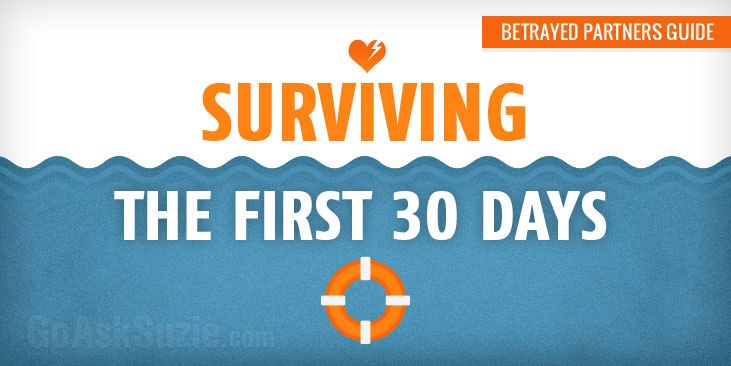In this article you will find
- Surviving the First 30 Days After Discovering the Affair
- Common Symptoms Triggered By The Discovery Of Betrayal
- Coping with the Aftermath of Infidelity
- Containing the Crisis of An Extramarital Affair
- Taking Responsibility For The Affair
- Coping With the Crisis of the Affair
- Adjusting To The Aftermath Of Infidelity
Can you imagine this happening to you?
On a cold, wet, winter morning, Ashley, a New Jersey housewife, had just returned from the usual Saturday morning soccer practice with nine-year-old twins Melissa and Isabella. She’d settled the girls with steaming cups of hot chocolate in front of the TV before heading to the master bathroom for a shower. While she was in the shower, the home phone rang. The caller ID said it was Daddy calling. One of the twins answered it.
“Hi, Daddy,” the little girl said. But there was no response.
“Hello, Daddy, are you there?” She waited, but still no response. She could tell there was someone on the line… The voice seemed muffled. It sounded like her father’s voice, but Isabella couldn’t quite make out what was going on.
“Daddy! Can you hear me?” Although there were some vague sounds in the background, there wasn’t a clear response from her father. Not sure what to do, Isabella took the phone to her mother in the bathroom. “Mommy,” she said, “Daddy is on the phone, but I can’t make out what’s he’s saying.” Puzzled, Ashley took the phone. “Hey, Carlo? Are you there?” But it was the same thing. No clear response, just muffled voices… and a steady thump, thump, thumping noise.
The hairs stood up on the back of her neck.
As she made the chilling connection — the muffled voices, the vague moans, the steady thumping rhythm— the unmistakable sounds of two people making love. “Carlo!” she screamed desperately into the phone, praying against all odds that her suspicions were wrong. “Carlo, please answer me!” But all she could hear was the steady thumping sounds, increasing faster and faster, until she heard the one thing no wife should ever have to hear — the sound of her husband reaching climax in the arms of another woman.
In that instant, a waking nightmare began.

“From that moment,” she later told me, “It was as if someone had taken a shotgun and blown a hole through my life and shattered everything into a million pieces. I could hear the kids asking me, ‘Mommy, what’s wrong?’ but their voices seemed so far away. I wanted to answer them, but I couldn’t. I wanted to reassure them, but I couldn’t. I wanted to get up off the floor, but my legs
were jelly. I wanted to hang up the phone, but I couldn’t,” she said. “It was like watching a horrible car wreck and being unable to look away. I was glued to the phone. I was repulsed yet hypnotized by what I was hearing. I wanted to hear everything they were doing. I couldn’t have stopped listening even if my life depended on it.”
So, she listened…
…as they re-arranged clothes, made crude jokes, and shared silly laughs. She listened… as the man she had loved for 17 years told another woman how great she was, how she had just rocked his world, and how much he’d like to see her again. She listened… as the other woman agreed to see him again. She listened… as he started the truck. She listened… as he drove the other woman to her car. She listened… while they smooched and slobbered a good-bye kiss, and gave each other promises to keep in touch.
And that’s when she recalled the first wave of anger…
…when it dawned on her that he’d just cheated in his brand new truck! The same one they’d scraped up every dime to buy for him, while she and the girls made do with an 11-year-old minivan.
Like red-hot lava, the anger began to simmer in her stomach, as she patiently waited for the moment when he’d realize that his cell phone had pocket-dialed home, while he was having too good a time to notice.
She didn’t have to wait long. She could even sense the exact moment his mind made the connection as he picked up his phone and saw that it said CALL CONNECTED… HOME. After a long pause, he finally said “Hello?” to which she said, in a deathly cold voice, “Don’t even bother coming home, you lying son of a bitch!” Then, she hung up the phone.
Where Do You Go From Here?
The first few moments after the discovery of a partner’s betrayal are hard to describe. If you’ve never been there, no words can paint an accurate picture.
I’ve heard it likened to having an out-of-body experience. Some people have said they had a sensation of time slowing down; others talk about an overwhelming sense of grief. Some flew into a fit of rage, some threw up, and many can’t even remember what happened in the first few moments.
As with any unexpected crisis, after discovering infidelity, everyone reacts differently. But while the intensity and degree of the physical and emotional reaction varies, the one thing that everyone experiences… is an overwhelming sense of confusion.
Ashley, the New Jersey soccer mom, was no different.
Nothing in her life had prepared her to handle that kind of situation. And because she had no idea what to do, for the first three days, she didn’t do anything.
During those first three days…
…she remembers not being able to sleep, having no appetite, and feeling like she was in a waking nightmare — while her estranged husband called, texted, begged, and pleaded to be allowed to come home. She recalls putting on her game face for the twins, but realizing they could sense something going on between Mommy and Daddy. (Their dad had never slept away from home before.) By around the third exhausting day of not knowing what to do, Ashley did what so many in her shoes have done; she turned to the Internet for help. After about three hours of searching and researching, she came across a recommendation about my website. And, in her words, “What I read on your site helped restore my sanity.” It took her three more days before she worked up the courage to make an appointment, so by the time I first spoke to her, it had been a little over a week since the day of discovery.
She had so many questions… and very few answers.
Although she didn’t know it at the time, she had already begun the process of recovery, because seeking guidance when you’re lost is usually the best way to begin. What follows next is a collection of my answers, advice, and insights for some of the most common questions that Ashley and others in your situation have asked about. What to do (as well as what not to do) in the first thirty days following the discovery of a partner’s affair.
MY STATEMENT OF INTENT: Keep in mind that this is general information about typical situations and scenarios encountered during the first 30 days after discovery. My opinions and suggestions should, in no way, replace your own judgment or the advice of a medical professional. The most I can do is share with you my perspective and suggestions, to lay the groundwork for successfully navigating through this difficult time.
Notice: When it comes to dealing with the aftermath of a crisis, there are no exact formulas, no perfect recipes, and no one right way. Instead, I present guidelines and pointers to help you find your own way back to normal in as few steps as possible.
To help you avoid being overwhelmed, and to make it as easy to digest as possible, I will break it down into two stages:
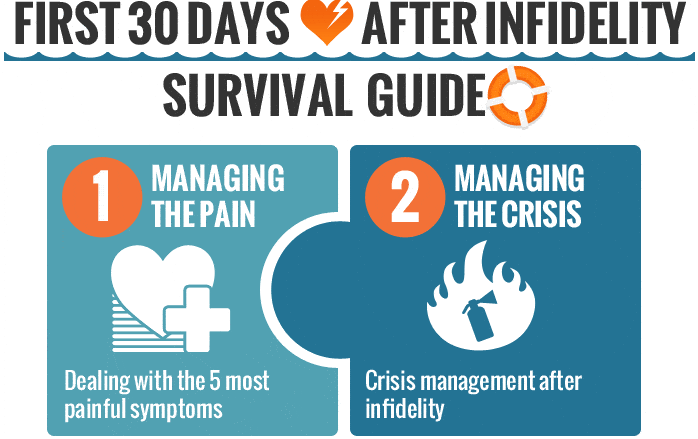
Common Symptoms Triggered By The Discovery Of Betrayal
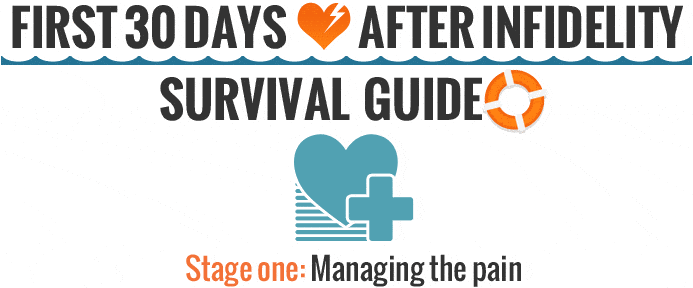
The goal of stage one is twofold: (1) to prepare you so you can better handle some of the more common symptoms experienced in the first 30 days after the discovery of an affair; and (2) to help you find comfort in the knowledge that you’re not alone in what you might be experiencing or going through right now.
Notice: Although these are common symptoms generally experienced, they’re not automatic, and the levels of intensity vary from person to person. However, if any of these symptoms seems excessive or prolonged for you, please contact your doctor immediately. With that said, let’s take a look at five of the most common (and painful) symptoms triggered by the discovery of betrayal.

Disorientation, Denial and Disbelief
The Signs: Feelings of confusion and surrealism, thoughts like “I can’t believe this is happening,” out-of-body sensations, nausea, numbness, chills
The Triggers: Disorientation… comes from the loss of predictable reality. Denial (This isn’t how it was supposed to be. This can’t be happening to me!) comes from unwillingness to accept a new reality. Disbelief (I thought we had the perfect marriage?) comes from things not matching your expectations.
What You Need to Know: These symptoms can be described as a type of emotional vertigo. What is vertigo? It’s the loss of balance. It’s what happens when your inner ear loses its orientation. It feels like your surroundings are moving or spinning even though they aren’t. A similar loss of orientation happens when our expectations and our reality don’t match. This is what gives us the sensation of the world being turned upside down; it can even be accompanied by the same physical symptoms as regular vertigo — dizziness, nausea, upset stomach, and headaches.

In order to reorient yourself, remember: Only ONE thing has changed, NOT everything. To get your bearings again, look around and find things that have not changed. Seek your peace in those things.

The Knee-Jerk, Hysterical or Reactive Response
The Signs: Hysterical tears, throwing out the offender, filing for divorce, tantrums, meltdowns
The Triggers: Self-preservation, defensiveness, fight-or-flight instinct
What You Need to Know: The knee-jerk or reactive response is hardwired into our nervous system. It’s the modern equivalent of the old fight-or-flight response. This is why when a stressful situation becomes too threatening, almost without thinking, we react by fighting or trying to escape. The thing to note is that fighting and running away are not the only options available to you. You have other choices. You’re not limited to just two ways of handling a crisis. Give yourself a chance to learn some new ones.

Plant both of your feet on the ground. Tell yourself that you can run away or you can run toward. Make the decision to run towards the things you want, rather than running away from things you don’t want. Now, make a list of things you want to run towards — things like… normalcy… happiness… and good sleep. Keep that list with you as a reminder of what you do want.

Grief
The Signs: Uncontrollable crying, feelings of loss, anger, confusion, lack of interest in usual activities, and needing to retell the story of what happened
The Triggers: The discovery of betrayal often triggers the stages of grief. That’s because your partner’s betrayal equals loss of trust, loss of security, loss of respect, and perhaps most importantly, the loss your dreams for a perfect relationship.
What You Need to Know: Grief is a natural response to loss (and type of loss). It’s often an involuntary process like labor pains, when Mother Nature simply hijacks you and takes you for a ride. How you grieve and how long you grieve is highly individual. It’s impossible to compare your grief process to that of another.
However, keep these two things in mind:
- It’s important to acknowledge that you are grieving.
- It’s equally important to get out of your own way and allow the grieving process to unfold naturally.

Allow the grief-like emotions to pass through you. Don’t judge them. Don’t try to evaluate or analyze them. Don’t block, defend or attack them. Just allow them to pass.

The Urge to Make the Pain, Problems, and Discomfort Disappear
The Signs: Having thoughts like: I can’t handle this. I just want to escape. I just want this to go away. I want to pretend this never happened. I need something to help me forget.
The Triggers: Loss of certainty, the loss of predictability, and the not knowing how to handle this difficult situation
What You Need to Know: A big challenge we all face in life is learning how to deal with emotional pain and hurt when we are blindsided by it. I know that many of you (myself included) would do just about anything to avoid feeling hurt. And yet sometimes, in our effort to make the pain go away, we turn to a cure that is worse than the problem.

Remember: This, too, shall pass. Although painful, this is a temporary situation. A bigger mistake would be to mentally project the pain into an indefinite future. The good news is, ALL feelings are temporary… even the painful ones. (Isn’t that good to know?)

The Urge for Revenge, Retaliation, or Punishment
The Signs: Fantasies of revenge, the desire to make the offender pay, the need to punish, wanting to see them suffer, wanting to get even
The Triggers: Loss of power, sense of injustice, desire to restore the balance of power and correct the mistake
What You Need to Know: Punishment and correction aren’t the same. If they were, our prisons would be empty. The desire to punish might give a temporary ego boost, but it will not correct the thinking that led to the affair in the first place. Another thing for you to keep in mind is this: revenge doesn’t restore justice. It simply perpetrates injustice, except that when you take revenge, the roles are reversed — you become the perpetrator, and they become your victim. And no matter how many times you flip that coin, a wrong action cannot make things right.

Remind yourself of what you really want. You want to regain power. You want to transcend. You want to rise above. You want to win. Punishment, revenge or retaliation can’t deliver any of those things to you. Only true forgiveness can do this.

The Obsessive Need to Reconstruct, Deconstruct and Analyze What Happened
The Signs: Interrogating your partner, harassment, constant questioning, needing to know every single detail, trying to reconstruct the timeline, wanting to know everything about the affair partner
The Triggers: The need to know why, trying to find meaning to the madness, the need to prevent future recurrences, and the urge to find the truth
What You Need to Know: The urge to reconstruct the events after any disaster is a natural response. (For example: NTSB does this after an airplane crashes, and CSI does this after a crime has been committed.) So, what are we looking for? What are we hoping to discover? Here it is: we want to find clues to why what happened… happened. This process of reconstruction is called “the rituals of reassurance.” We want to know exactly what happened, so we can reassure ourselves it won’t happen again.
I believe these rituals of reassurance are important.
This is why I encourage all wayward partners to cooperate. I believe the offender should try to be as transparent as possible because I understand how compelling the desire for details can be. However, these rituals of reassurance and reconstructions of events must have guidelines and time limits.
Here’s why: At first, details, clues, and descriptions that help you reconstruct what happened are helpful. They help you make sense of what seems so senseless. However, there comes a time when clues, evidence, proof, details, and descriptions cross the line from helpful to harmful.
When do rituals of reconstruction cross the line?
When they become a weapon for further destruction. Believe me, you’ll know when that happens. Usually, a reliable sign is when there’s no new information, but you can’t stop asking, or when you find that you’re simply digging up the same evidence over and over again.
And that’s not the only danger…
Sometimes, what starts out as a helpful ritual of reassurance, ends up becoming an obsession — the kind that sucks up all your mental and emotional energy like a tornado. And rather than moving on, you remain stuck in the muck, for much longer than necessary.

View any information gained after the fact as a teaching aid, not a torture device. If you find that you’re unable to do that, then consider letting sleeping dogs lie.
There you have it. The five most common symptoms triggered by betrayal, and my suggestions on how to handle them.
Now let’s move on to stage two…
Coping with the Aftermath of Infidelity
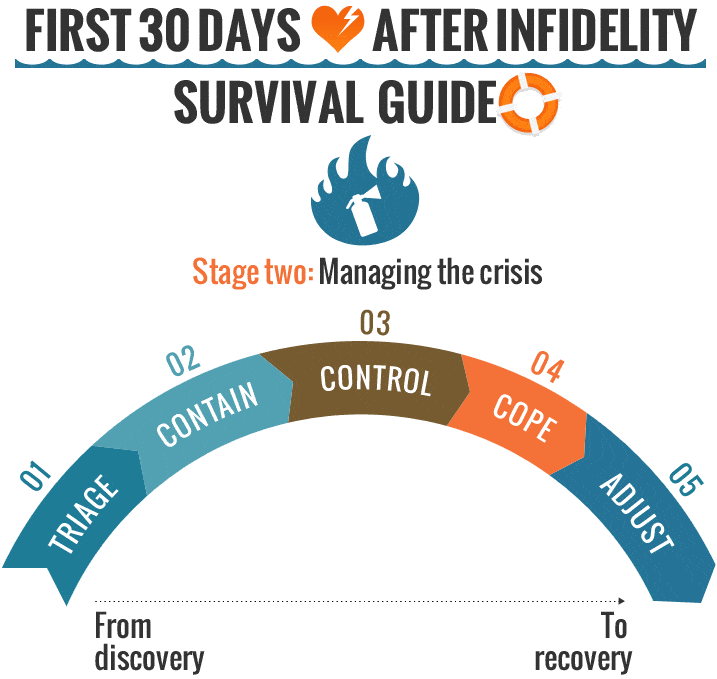
When infidelity blindsides you, the unexpectedness of this type of discovery rips a hole in the very fabric of your reality. And once this gap has been torn open… chaos, insecurity, anger, blame, confusion, and fear rush in. This is where having good crisis management techniques will help you.
Why do you need to learn crisis management?
I know it’s more of a business term than a personal one, yet the principles still work. That’s because the discovery of a partner’s infidelity is a crisis in the same way that an earthquake or financial meltdown is a crisis… YOU’RE NOT PREPARED FOR IT. This means you usually have no plan for dealing with it. Therefore, I’m going to teach you five core crisis management steps that will help you regain control while also preventing further damage.
I suggest you print these out or write them down and commit them to memory. Chances are you’re going to need them in the days ahead.
NOTE: These steps aren’t linear. They don’t have to be done in any order. In fact, when you find yourself overwhelmed, you can begin with any step you want, and it will be enough to help you turn the tide.
Let’s review each step in depth.

Triage
I borrowed the term “triage” from the medical field. It describes the way nurses and doctors assess the immediate needs of patients during a medical crisis. Although I’m not a doctor, and this is obviously not a medical crisis, I do believe the ability to triage in a crisis is a critical skill.
How to Triage During a Personal Crisis
Prioritize Tasks: Nice vs. Necessary. Assign each of your tasks to one of two categories: the things that would be nice and the things that are absolutely necessary.
For example:
Necessary: includes eating, bathing, grocery shopping, getting the kids to school, and going to work.
Nice: might include baking a pie for the bake sale, volunteering for that project, and watching your sister’s kids. During a crisis, do only the necessary tasks. Let everything else go for now.
Put Your Needs First. Forget about everyone else for a while. Let the world take care of itself for the next few weeks. During a crisis, it’s important to give yourself permission to place your own needs ahead of others. You’ll find that your needs fall into two groups — physical needs and emotional needs.
Caring for Your Physical Needs: Taking care of your physical well-being is a top priority, because stress uses up a lot of physical energy. And failure to take care of yourself physically can often compound an already difficult situation. This means what you eat is important. Getting enough sleep is important, because you’re going to need all the energy you can get in order to get through this.

- Go to your doctor. See either your primary care provider or OBGYN. It’s important to check for sexual disease (regardless of what they say, you need to be sure) as well as to get advice for maintaining your emotional and physical well-being during the next few weeks.
- Stock your refrigerator. To help with energy, your body needs quick and easy access to nutrition. Things like bananas, apples, pears, and leafy greens are nourishing and fast-acting.
- Take good multivitamins. Get your doctor’s advice. Even if you’ve never taken vitamins before, this is the time to start.
- Get good rest. Sleep is one way the body heals itself. If you’ve never been an afternoon napper, this may be the time to become one. The key is to allow yourself rest when you need it. For once, let the dishes stay in the sink and allow the laundry to pile up. I prefer that you rest right now instead of trying to keep up appearances.

- Increasing caffeine/sugar/alcohol intake
- Turning to prescription drugs or medications unless recommended by your doctor
- Disrupting exercise or other physical routines
- Going on an eating binge to handle the discomfort
- Resuming negative habits like smoking
How to Take Care of Your Emotional Needs: Here’s the thing about infidelity: It’s more of an emotional crisis than it is anything else. This means you can expect to deal with various emotional responses ranging from anger to depression, from hopefulness to hopelessness, from loss of libido to heightened libido.

- Strip life down to the basics. Live one day, one minute… even one second at a time.
- Do only one thing at a time. Make the present task the most important task.
- Live in permanent today. Focus only on what you have to do today, where you have to be today, what you have to eat and accomplish today.
- Be gentle with yourself. Be kind to yourself in your thoughts. Don’t judge. Don’t self-torture.
- Practice positive self-talk. Say to yourself, “You are safe now. You can handle this. It’s not the end of the world. This, too, shall pass.” Repeat as often as needed.

- Becoming isolated, withdrawing from life
- Turning to negative or destructive habits to deal with pain and discomfort
- Taking on responsibility for what happened (this isn’t your fault)
- Feeling singled out, feeling like a martyr or feeling like a victim
- Using your imagination to obsess about the details and torture yourself
Keep This in Mind
No matter how much pain you are in, it’s a temporary state. You will not be in crisis mode forever. The hurt is not endless. You will survive. Although it might be hard to believe today, the day will come when this no longer hurts.
How can I be so sure? (Because I’ve been there.)
I have passed through the valley of the shadows. Not only that, I have helped many others just like you pass through it as well. I have witnessed the impossible become reality. I have seen the worst become the best, and I have watched as people found a way to turn a bitter lesson into lifelong benefits. It humbles me to say it, but we are a resilient lot. You and I are not the exception — we’re living examples of that resiliency.
Let’s move on to…
Containing the Crisis of An Extramarital Affair

Crisis Management - Step #2: Contain.
When the Exxon Valdez hit that iceberg in Prince William Sound in Alaska, on March 24, 1989, it spilled millions of barrels of oil into the ocean. In response to the disaster, the Exxon Corporation launched massive damage control initiatives. Not only were they trying to contain the spill area, they were also desperately trying to limit the negative impact the disaster would have on the environment, their stocks, their brand, and their image. You can model the same principles in your own situation. From the moment of discovery, it’s crucial for you to begin to think in terms of damage control and minimizing the negative effects.

Telling the kids too much, too soon
If there’s one thing betrayed partners often tell me they regret when they look back, it’s this: telling the children what the other parent had done… too soon and in too many details. This is unfortunate indeed, because children don’t measure parents the same way adults do. To children, their parents’ behavior reflects on them as well. And even though it’s not true, children often find ways to take on their parents’ pain, guilt and shame.

Tell them what they need to know, when they need to know it.
Kids know that Mom and Dad don’t have a perfect relationship. In fact, watching how you guys handle problems is a big teaching tool for them. Therefore, no parent needs to pretend to be perfect. However, it’s a bad idea to disillusion your children deliberately. Remember that a parent is never measured by the same yardstick as a husband or wife. A man might be a horrible husband, yet he still makes a great father. Children need to know any information that affects them, but they don’t have to be told in ways that devastate them.

Confiding in the wrong people
I don’t know about you, but I’ve always had a strong GFN (girlfriend network), a group of women I turn to whenever I feel the need to process something, because whenever I get my feelings hurt, or find myself overwhelmed, stressed, or confused about something important, talking to my girlfriends can do a world of good. Some of these are women I’ve known since college; some I’ve met more recently. But with all of them, I felt close enough to share anything and yet… when infidelity rocked my marriage, I didn’t tell them.
Maybe this doesn’t surprise you, but it sure did surprise me, and let me tell you why. Just about all of my girlfriends have had their own brushes with infidelity. One had a father whose philandering ways deeply scarred her childhood. A couple of them had cheating ex-boyfriends whom they still hadn’t forgiven. I still remember the harsh judgments, the callous statements, and the sense of pity we felt towards those women. In my mind, those things disqualified my GFN as objective listeners.
While I longed for their sympathy and support, it would have been like drinking chicken soup when you have a cold — comforting but not really the healing you need.
Now, I had to ask myself another question: If I couldn’t (or choose not to) turn to those in my inner circle for help, who else was available?
For me, the answer was clear.
I wanted to talk to others who had been through the fire of betrayal and emerged from it stronger. I wanted to talk to men, women, and couples who had overcome this. I wanted to talk to survivors, but not just any type of survivors. I wanted to find those who had found ways to thrive, who had managed to take this bitter experience and turn it into a benefit. The good news is that once you have a clear idea of what you’re looking for, it’s much easier to find it.

Only talk to people who can help.
Don’t be too quick to confide in those who can’t possibly understand what has happened or to those who have experienced it but haven’t recovered. I believe who you talk to right now is extremely important. You need to know you can trust them, not just today, but in the future. You need to know they can be objective — that they can tell you not just what you want to hear… but also what you need to know. While friends and family are great for providing comfort and sympathy, they may not be able to provide much more. And there comes a time when sympathy isn’t enough. You will need to learn some real survival skills.
Now, let’s talk about Crisis Management Step #3…
Taking Responsibility For The Affair

Control
The first thing we lose when a betrayal is revealed… is our sense of security. What happens when we lose that sense of security? We’ll move heaven and earth to regain it. We’ll do almost anything to restore that sense of certainty back into our life.
What restores security?
Security is restored when we feel we can predict (with a high degree of accuracy) what the outcome of something will be. In order to feel secure, we must have the right combination of predictability, reliability, and trust. And we feel insecure when any of these are taken away or are missing.

Take control of what happens next.
You are not helpless. No matter how powerless you might feel, powerlessness is a feeling, not a fact. You weren’t able to prevent what happened, and yet you can predict what happens next, because a lot of that is up to you. Be mindful of the fact that while you can’t control what happened before, you can control a lot of what happens next.

Trying to change what happened. (Instead, seek to change how you feel about it.)
One of my favorite teaching books is called “Love is Letting Go of Fear,” by Gerald Jampolsky.
In this book, Gerald describes forgiveness as “giving up all hope of having a better past,” and this description rings true for me. Why? Because the past is over, permanently. It takes great mental effort to pretend that it’s not, and yet people do it all the time. They invest precious time and emotional energy trying to achieve the impossible… a way to change the past. Don’t waste another moment of your time trying to do something that’s impossible. Instead, why not turn your attention to what IS possible… for you to change? This begins with the understanding that while you can’t change the past, you can change your mind about what it all means.

Taking responsibility for the affair.
If I could drill anything into your head at this point, it would be…
THIS IS NOT YOUR FAULT!
Why am I so sure?
Because you were never given a vote. Did you hear that? Can you see why this is true? Knowing this takes the weight of guilt and shame off your back, doesn’t it? Well, let them roll off, because they don’t belong there anyway. You can’t, and never will, be responsible for anybody else’s choices. You’re not responsible for your partner’s choices, but you ARE responsible for your response to those choices.
So, if you’re not responsible for the affair, what are you responsible for?
- It’s your responsibility to get on the road to recovery… ASAP.
- It’s your responsibility to take care of yourself. This isn’t the time to abandon your health, your passions, and your hobbies.
- It’s your responsibility to forgive. I know, I know… you don’t want to hear the “F” word right now (talking about forgiveness, of course), and that’s OK. However, I simply want to point out that true forgiveness is ultimately for you (not them). It changes you. It frees you. It restores peace to your life.

Take responsibility for solutions.
You have choices. You have options. You have alternatives. You are NOT trapped. The key here is to keep your mind focused on the solutions. Keep looking for what will work. Keep in mind that the solutions — not the problem — are your responsibility.
Moving on to Crisis Management Step #4…
Coping With the Crisis of the Affair

Cope
In order to be able to function, we all need strategies and tools of thought to help us navigate through the uncertainties of life. These are known as coping strategies.
There are two types of coping strategies: those that work and those that fail.
The right coping strategies are the ones that get you the results you want. The wrong coping strategies are those that fail to get you what you want. In the aftermath of infidelity, the key is to make sure you only use the ones that actually work. Here’s my quick guide to help you discern the differences between wrong strategies and right ones.
Right Coping Strategies Vs. Wrong Coping Strategies
Powerless vs. Helpless: This is a distinction that 12-step groups like Alcoholics Anonymous often use. Recognizing your essential powerlessness over a person, place, or thing keeps you from getting caught up in a toxic need to control. (It’s very easy to be controlled by your need to control!) While you’re powerless over someone else’s choices, you’re not helpless over your own choices.
Processing vs. Suppressing: Denial, burying your head in the sand, pretending it never happened, OR burying your pain under work, sex, alcohol, or drugs are all acts of suppressing rather than processing the hurt. Here’s the sad news about suppressing pain — it’s like burying a vampire that always rises again. It’s better to learn healthy ways to properly process your hurt so it goes away forever. It might take you longer, but it’s always better in the long run.
Seeking Help vs. Seeking Sympathy: Sympathy is nice. We all like that feeling. It’s warm and cuddly. It gives us a sense of connection and understanding… all of which is important. But don’t confuse seeking sympathy with seeking help. The two aren’t the same, and I believe you need both. Get your sympathy from those you love, and get your help from those who can provide you with the tools and strategies to help you move forward.
Solving vs. Obsessing: People do what they’re rewarded for doing. And obsessing or fixating on problems has its own payoff. But here’s the thing: obsessing is like chewing gum… you go through the motions of eating, but it will never fill you up. To obsess is to stay focused on the problem. To SOLVE the problem… is to focus on finding the way out. So rather than allowing yourself to problem obsess… it’s better for you to problem solve.
Rational Decisions vs. Emotional Decisions: Rational decisions come from critical thinking. This means making decisions based on facts and the principles of logic — not feelings. Infidelity stirs up feelings like dirt in water. So, it’s better to wait until your emotions calm down before making decisions. This way, you’re more likely to make rational decisions instead of emotional ones.
Correction vs. Punishment: A common misconception is believing that punishment is the same as correction, and yet, it’s not. Punishment introduces man-made consequences for certain actions. The goal of punishment is to make the consequences so painful, the offender will voluntarily avoid making the same mistake in the future.
Notice the word voluntarily?
It’s important that you notice it here, because punishment — while noble in its intention — is often ineffective… because it can’t achieve that voluntary state of mind. In fact, most punishment only achieves a temporary state of compliance. But underneath compliance, lurks defiance. And that defiance simply awaits the opportunity to rebel, often with a vengeance.
So, if punishment is not always corrective, then what is? Good question. The answer is… learning success. And learning success doesn’t come from avoidance of what we fear; it comes from attraction to what we love. When a person learns what is valuable, what is worthy, and what is meaningful, that learning lasts forever. They won’t need to be watched, they won’t need to be controlled, they can be trusted. Therefore, it’s more important to focus on correction instead of punishment.
Forgiving vs. Condoning: It’s important to recognize that forgiving is NOT condoning. A mother forgives her child’s tantrum because she can see beyond his behavior, but in no way does she condone that behavior. A good mother will help the child take responsibility for his actions. She will help him see the negative consequences to himself; however, she will not mistake the child for the child’s behavior. She forgives the behavior and corrects the child, but she doesn’t condemn.
Active Recovery vs. Passive Recovery: There are basically two approaches to infidelity recovery: active recovery and passive recovery. Passive recovery describes a wait-and-see attitude. This approach is rooted in the belief that healing and recovery waits for time. Active recovery, on the other hand, describes a proactive responsibility. Here, the major attitude is that healing and recovery isn’t so much a matter of time as it is a matter of permission.
Which way is best?
That’s your call. However, it’s my opinion that while time may heal all wounds, it does so very slowly. I’ve known many people who’ve carried around betrayals, hurts, grief, guilt, pain, sorrows, and broken hearts for years while they wait for time to work its magic. This is why I’m an advocate of the active recovery approach. I believe that once you get knocked down, it’s your responsibility to get back up. And life is too short (and too good) to hang on to hurt, bitterness, or resentments for long. In fact, I believe that while waiting for time to heal you, you waste a lot of precious time. So why not help Mother Nature as much as you can? That’s what active recovery is all about.
Let’s take a look at the final step in my Crisis Management process…
Adjusting To The Aftermath Of Infidelity

Adjust
There’s no doubt that infidelity changes things irrevocably. Once it’s happened, you can’t make it “un-happen” (no matter how much you wish you could). This means you either have to adjust to this new reality, or you try and resist it. Once something has happened, those are your only two options: adjust or resist.
You’d be surprised how many people spend their entire lives fighting, arguing, denying, and trying to wish away reality. In fact, if psychological suffering can be summed up in one word, that word would be resistance. We, human beings, have a tendency to hold on stubbornly to that which is already gone. We spend hundreds of days of our lives trying to undo and press the “back button” in life. Sadly, no such button exists. However, there’s no need to despair, because although life doesn’t offer an undo feature, it does have a “cancel button.”
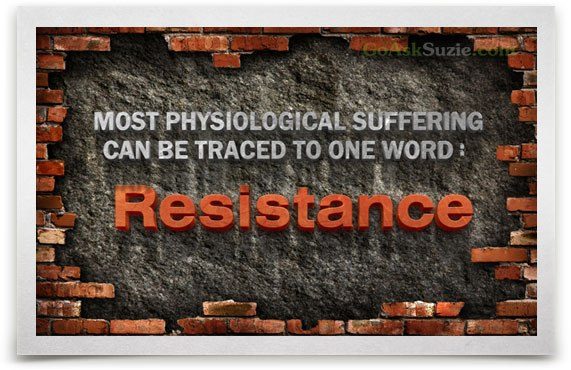
What’s the “cancel button” in life?
It’s called true forgiveness — and the word literally means, “to cancel.” When you choose to forgive a wrong done against you, what you’re doing is canceling all of its negative effects in your life.

- Rather than resist the winds of change… adjust your sails.
- Rather than fight reality… flow with it.
- Rather than deny reality… embrace it.
- Rather than trying to fix the past (impossible)… try to forgive the past. And in doing so, cancel the negative side effects.
So, there you have it…
You’ve just completed my crash course on personal crisis management during the first 30 days after the discovery of infidelity. I have faith you found something useful in each of the five steps.
If you’d like more step-by-step guidance, you can download and listen to my home study coaching program for the Betrayed Partner. It includes a session called First Aid: Surviving the First 30 Days After the Affair. In this session, I coach you through several of my daily steps, affirmations, and strategies that will certainly help carry you through.
Putting It All Together
Let me tell you a a classic Zen story.
A Japanese warrior was captured by his enemies and thrown into prison. That night, he was unable to sleep because he feared that the next day, he would be interrogated, tortured, and executed. Then the words of his Zen master came to him: “Tomorrow is not real. It is an illusion. The only reality is now.” Heeding these words, the warrior became peaceful and was able to fall asleep.
Here’s what I believe.
Just like that Japanese warrior, you too can survive this (and any other crisis) by staying in the present, taking it one day at a time, and only dealing with things as they emerge and not a moment before. Do this, and you can experience peace even in the midst of crisis.
Until we speak again…
Remember… Love Wins!















